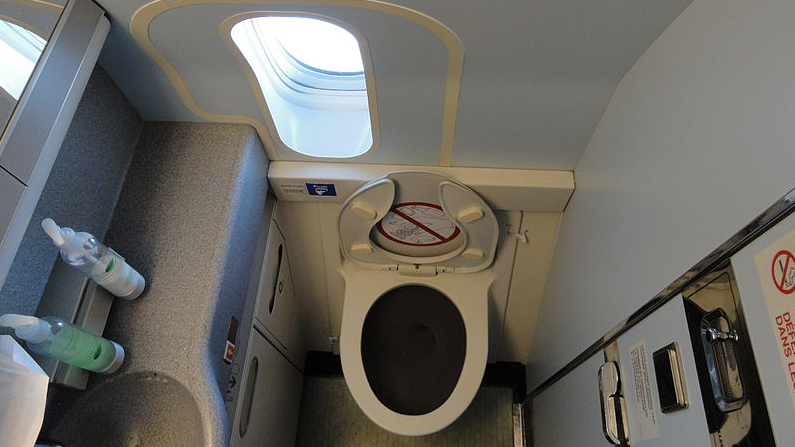There are few things more uncomfortable on most modern day airplanes than the lavatory. Your maneuvering room is limited to about 3 feet by 3 feet (if you’re lucky), the flush is so loud that it could wake the dead (here’s why, as well as what a college team invented to make it less of an issue), and you may have to deal with embarrassing design flaws such as this.
But while you’re sitting (Or standing. Or…hovering) in there, have you ever wondered what happens after you’ve gone? I have (half of my friends are not the least bit surprised by this, by the way). So I started researching. Here’s what I found out.
When you flush
There were different systems in the earlier days of flight, but since the mid-1970s or so, plane toilets generally use the same system. The toilet bowls themselves are non-stick, and the airlines use something called Skychem (or a similar solution, if they don’t use that particular brand), which is a disinfecting liquid.
When you flush, a trapdoor in the base of the toilet bowl opens, the liquid is released, and everything is sucked out of the bowl at a high rate of speed. The suction is what pulls all the waste material and the liquid ensures that (A) everything goes down and (B) the toilet is disinfected between flushes.
Storage of the “stuff”
The waste goes through plumbing to the back of the plane, where it’s stored in sealed tanks.
To give an idea of how much the tanks hold, on a long-haul flight on a 747, there may be close to 1,000 flushes throughout the flight. That would make for about 230 gallons of sewage (1 gallon = about 8.34 pounds. So figure just under a ton).
After landing
After the plane has landed, many things happen – passengers are disembarked, the plane is cleaned, luggage is removed, food, drink and other supplies are replenished.
There’s also a literal s**t ton of waste material in the holding tank to dispose of.
A special truck, sometimes called a honey wagon or honey truck, siphons the waste material out, transferring it to its own holding tank. It’s then disposed into the airport’s underground sewage system.
Feature Photo: Kristoferb / Wikimedia
Want to comment on this post? Great! Read this first to help ensure it gets approved.
Like this post? Please share it! We have plenty more just like it and would love it if you decided to hang around and get emailed notifications of when we post. Or maybe you’d like to join our Facebook group – we have 23,000+ members and we talk and ask questions about travel (including Disney parks), creative ways to earn frequent flyer miles and hotel points, how to save money on or for your trips, get access to travel articles you may not see otherwise, etc. Whether you’ve read our posts before or this is the first time you’re stopping by, we’re really glad you’re here and hope you come back to visit again!
This post first appeared on Your Mileage May Vary
Join our mailing list to receive the latest news and updates from our team.

